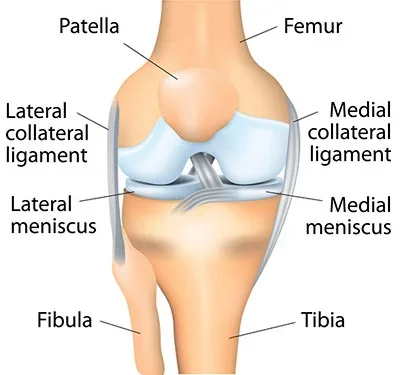Knee
Surgical Procedures
Click on a procedure below to view the frequently asked questions.
Anterior Cruciate Ligament (ACL) Reconstruction
Cartilage Repair
Distal Femoral Osteotomy (DFO)
Meniscal Root Repair
Osteochondral Allograft (OCA)
Patellar Tendon Debridement
Partial Meniscectomy/Debridement
Posterolateral Corner Reconstruction (PLC)
Proximal Tibial Osteotomy
Quadriceps Tendon Repair
Tibial Tubercle Osteotomy (TTO)
The Anatomy of the Knee
The knee allows movement and weight-bearing activities like walking and running. This joint functions primarily as a hinge with added rotational and side-to-side stability. It comprises three bones—the femur, tibia, and patella—which form two key joints that enable motion and absorb force. Smooth cartilage at the bone ends reduces friction, while ligaments, menisci, and surrounding soft tissues provide structural support. Muscle groups such as the quadriceps, hamstrings, and calves further stabilize the joint.
Benefits and Risks of Knee Surgery
Benefits
In well-indicated patients, knee surgery has the opportunity to provide benefit, including improved strength, reduction of pain, and improved range of motion, compared to an injured state. The goal of surgery is to restore a higher level of function. When performed at the right time and with proper rehabilitation, knee surgery can lead to postive functional outcomes.
Risks
Despite its benefits, knee surgery carries notable risks that should be carefully considered. Common complications include infection, blood clots, and implant failure over time. Some patients may experience stiffness, weakness, or limited range of motion if rehabilitation is not properly followed. There's also the possibility that the knee has persistent pain due to other underlying issues. These risks underscore the importance of thorough pre-surgical evaluation and commitment to post-operative recovery.
Schedule an Appointment
Schedule an appointment with Dr. Alyssa Althoff today to receive expert, personalized orthopedic care tailored to your active lifestyle.
